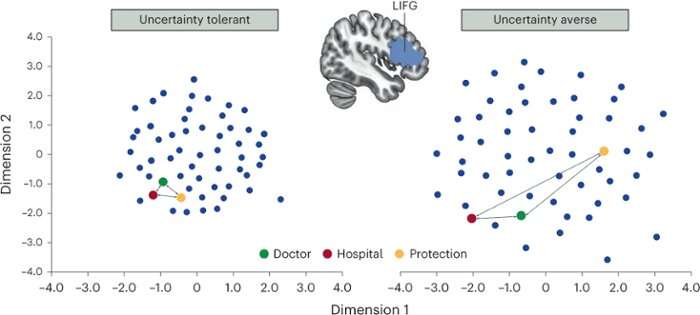
Always taking the same route to work, going for that one dish in restaurants and going on the same holiday each summer: this may ring a bell for those who don’t like uncertainty. Researchers are now discovering that this aversion affects how we understand the world.
Marc-Lluis Vives researches the relationship between cognition and individual differences at Leiden University. Together with his colleagues, he investigated how our personality affects how we conceptualize the world around us. A topic that has been little studied, partly because it’s so complex. Yet they found a remarkable link. Here, he answers questions about his latest study published in Nature Human Behaviour.
What was your research about?
Our concepts and categories allow us to make sense of the world by unifying a set of very different items on the same label. Concepts that are similar to each other, for example ‘sofa’ and ‘table’ are stored in memory closer together than concepts that have little in common, such as ‘sofa’ and ‘seahorse’.
But the world is not so simple to categorize, sometimes we encounter something that has no unambiguous meaning, like the concept ’tissue,’ which has multiple meanings. It can both relate to something you wipe your nose with, as the material from which our organs are made of. Different concepts are then activated in our brain, creating uncertainty about which concept applies in this situation.
This can be a challenge for people who can’t handle uncertainty well. Therefore, we hypothesized that people who are uncertainty-averse represent their concepts further apart, making such a representation easier to distinguish and thus reducing ambiguity. This would mean that these people represent their knowledge about the world in larger mental spaces. In short: we investigated how the need for reducing uncertainty influences the organization of our mental representations.
How did you research this?
We used several methods to demonstrate that people averse to uncertainty separate more concepts. First, we presented participants with different concepts, and asked them to what extent those concepts were similar. We also examined how comfortable the participants were with uncertainty. As it turned out, people who tolerated uncertainty poorly represented those concepts more distally, using a larger psychological space. They kept them more strongly separated from each other.
We then analyzed brain activity in different groups. Again, we found that the neural activity patterns associated with each word were more dissimilar in the left inferior frontal gyrus for people averse to uncertainty, those showing a larger neural space for representing meaning.
Finally, we investigated the behavioral consequences of this extended representation. In doing so, we found that people averse to uncertainty are better at distinguishing concepts (discrimination), but not so good at generalizing what they have learned from one concept to another.
What do you conclude from this?
Classically, individual differences have been neglected in understanding the basic principles that shape our cognition. We have shown that even one of the most fundamental processes, which is the capacity to ascribe meaning to the external world, can vary in a predictable manner depending on our personality needs.
This work opens new avenues to investigate its clinical applications, since people averse to uncertainty tend to also suffer from anxiety, a future avenue that we aim to explore in the future.
More information:
People who are averse to uncertainty exhibit expanded semantic representations, Nature Human Behaviour (2023). DOI: 10.1038/s41562-023-01566-0
Journal information:
Nature Human Behaviour
Source: Read Full Article